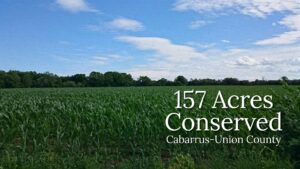
By Crystal Cockman
August 3, 2016
In North Carolina, agriculture and agribusiness account for one-sixth of the state’s economy and employees, and more than 17 percent, or $84 billion, of the $482 billion gross state product. It’s no wonder then that farmland preservation is viewed as important to the future of our state.
One of the ways we work to preserve agricultural lands in our state is through Voluntary Agricultural Districts. The purpose of the Agricultural District Program is “to encourage the preservation and protection of farmland from non-farm development.” Counties adopt Voluntary Agricultural District Ordinances (VAD) and Enhanced Voluntary Agricultural District Ordinances (EVAD), which provide for creation of an Agricultural Advisory Board to administer the programs. The boards determine where agricultural districts will be located and review and approve applications for qualifying farmland.

The North Carolina Agricultural Development and Farmland Preservation (NCADFP) Trust Fund was created in 2005 to support
The US Department of Agriculture has a similar program, the Agricultural Conservation Easement Program (ACEP), which “provides financial and technical assistance to help conserve agricultural lands and wetlands and their related benefits.” There is an Agricultural Land Easement (ALE) component where the USDA pays for a portion of the purchase of conservation easements, which protect the agricultural use and conservation values of the land. The Natural Resource Conservation Service (NRCS) may contribute up to 50% of the fair market value of the agricultural land easement, 25% can be a donated easement or bargain sale, and 25% has to be a cash match. NCADFP can contribute this cash match component.
For both of these programs, grants have to be applied for in order to have a chance of obtaining funds for purchase of the easements.
*Pictures on this page are of Rocky Pee Dee Farms in Anson County (top banner), and the Almond Farm in Stanly County, both protected by USDA and NCDA funded conservation easements.